Is Bacon Grease Flammable? How to Handle Grease and Reduce Fire Risk
If you love cooking with bacon, you’ve probably accumulated your fair share of bacon grease. That greasy liquid gold adds tons of flavor to everything from eggs to vegetables. But is bacon grease flammable? Should you worry about it catching fire in your kitchen?
The short answer is yes – bacon grease is highly flammable. Like any animal-based fat, bacon grease contains a high percentage of combustible carbon and hydrogen molecules. When heated these molecules break down into flammable gases that can easily ignite.
Understanding the fire risks of bacon grease is the first step toward handling it safely. In this article, we’ll cover everything you need to know, including:
- The science behind bacon grease flammability
- Common kitchen fire hazards
- Proper storage and disposal
- Safety tips for cooking with bacon grease
- Non-flammable alternatives
Let’s start with the basics.
What Makes Bacon Grease So Flammable?
Bacon grease is rendered pig fat. When fat is heated, the carbon and hydrogen molecules break down into smaller compounds like fatty acids and glycerol. The fatty acids are what make grease flammable.
Specifically, when bacon grease gets hot enough, the fatty acid chains break down and release hydrocarbon gases If these gases meet an ignition source like an open flame, they can combust
Bacon grease has a relatively low smoke point of around 375°F. The smoke point is the temperature at which an oil breaks down and starts releasing these flammable gases. For comparison, oils like avocado and grapeseed have smoke points over 400°F.
So bacon grease doesn’t need to get extremely hot before it becomes a fire hazard. Once it starts smoking in the pan, it’s breaking down into flammable compounds.
Common Causes of Bacon Grease Fires
Now that you know why bacon grease can easily ignite, let’s look at the most common causes of kitchen fires:
-
Grease buildup in the oven or on the stove – Bacon grease can accumulate surprisingly quickly, especially if you cook bacon often. If grease drips down the sides of a pan or splatters, it can coat the bottom of your oven or edges of your stovetop. When this built-up grease gets hot again, it can ignite. Even small flecks of bacon left behind can burn.
-
Leaving bacon grease unattended – Hot grease left sitting on the stovetop is a recipe for disaster. If you cook bacon and then leave the grease in the pan while you eat, the pan may still be hot enough to breakdown the grease and release those flammable gases. Never leave hot grease unattended, even for a minute.
-
Pouring grease down the drain – You should never pour hot grease down your sink. As it cools, it will congeal and coat your pipes. The buildup can block drainage and even cause sewage backups. Plus, if the grease is still warm as it flows down the pipes, it brings a fire hazard into your plumbing system.
-
Putting grease in the trash – Grease soaked paper towels or other greasy trash can spontaneously combust in a hot trash bag or dumpster. The small enclosed space traps the heat and allows the grease to ignite.
-
Disposing grease in compost – Compost piles don’t get hot enough to decompose animal fats and grease. So adding bacon grease to your compost just creates a flammable situation, especially if the pile is exposed to the sun. The grease could heat up, break down, and ignite any paper or other flammables.
Safest Ways to Handle and Store Bacon Grease
Now that you know what not to do, let’s talk about the safest ways to handle bacon grease after cooking:
-
Allow it to cool completely before storage – Hot grease is much more volatile and flammable. Let it cool down to room temperature before attempting to move or store it.
-
Pour into a sturdy, heat-safe container – Carefully pour the cooled grease into an airtight metal or glass jar, can, or bowl. Avoid plastic containers, which could melt. Make sure the container can withstand heat in case the grease ignites.
-
Store it in the fridge – The refrigerator prevents the grease from reaching room temperature and potentially breaking down. The cold also helps solidify the grease, containing any volatile gases.
-
Label the container – Write “Bacon Grease” on the jar so no one accidentally mistakes it for edible oil. Mark the date so you know when it was rendered.
-
Discard after 2-3 months – The proteins in bacon grease will start to break down after a few months, even in the fridge. Toss grease after 60-90 days.
-
Wipe up spills immediately – Clean any grease spills, splatters, or drips as soon as they happen, while the grease is still solid. Don’t let crusty grease build up on your stove or oven surfaces.
-
Avoid pouring down drains – Let grease fully solidify and scrape it into the trash instead. Never pour liquid grease down your sink.
With the right precautions, you can safely save and use bacon grease for baking, sautéing eggs, roasting vegetables, and more. Just be very careful when handling it in its hot liquid state.
Fire Safety Tips for Cooking with Bacon Grease
If you want to cook with bacon grease, keep these fire safety guidelines in mind:
-
Use low-to-medium heat – Don’t let the grease heat up past its smoke point. Keep temperatures moderate so the grease doesn’t break down too quickly.
-
Watch it closely – Stay near the stove and pay attention whenever you’re cooking with hot grease. Don’t leave the kitchen unattended.
-
Keep the area clean – Wipe up any grease spatters right away so it doesn’t build up on surfaces.
-
Use a splatter screen – This can minimize messy splashes and drips when frying.
-
Have baking soda on hand – Baking soda can smother a grease fire, so keep some near the stove. But never use water on a grease fire!
-
Turn off the heat immediately if it starts smoking – Don’t wait for an open flame. Smoke means the grease is already breaking down, so remove it from the burner.
-
Allow proper ventilation – Cook bacon grease with your kitchen fan on and windows open to allow gases to ventilate.
-
Let it cool completely before moving – After cooking, transfer the bacon grease to a metal container but don’t cover it. Let it cool down for at least 30 minutes before refrigerating.
Stay alert and prioritize fire safety whenever cooking with grease. Accidents can happen quickly, so be prepared to take immediate action at the first sign of smoke.
Non-Flammable Alternatives to Bacon Grease
If you love using bacon grease for flavor but want to eliminate the fire risk, these non-flammable alternatives can provide a similar taste:
-
Olive oil or avocado oil – For sautéing and medium-heat cooking, use a plant-based oil with a high smoke point. Avoid vegetable and canola oils which have more neutral flavors.
-
Chicken or duck fat – Rendered bird fats provide savory flavor for roasting veggies or potatoes. Refrigerate and use within a couple months.
-
Butter/ghee – For lower-temperature cooking, butter adds rich flavor. Clarified butter (ghee) has a higher smoke point than regular butter.
-
Coconut oil – With a mild coconut flavor, refined coconut oil has a smoke point of 450°F, making it quite versatile. Use for frying and baking.
-
Lard – Rendered and strained pig fat, just like bacon grease. Lard offers the same bacon-y flavor but usually comes from more neutral parts of the pig.
-
Bacon bits – Sprinkle crispy bacon bits over finished dishes to get smoky, salty flavor without the grease.
-
Smoked paprika – Just a teaspoon of smoked paprika powder can impart bold barbecue essence to recipes.
-
Soy sauce or miso – These umami-rich ingredients can provide deep savory flavors similar to bacon grease.
With safer grease alternatives, you can still get tasty bacon flavor in your dishes without putting your kitchen at risk.
Master Caution When Cooking with Flammable Fats
Now you know that bacon grease is highly flammable when heated improperly. But armed with this knowledge, you can take steps to handle it safely. Allow grease to cool completely before storing it. Keep cooking areas clean and grease-free. Monitor fats closely while cooking. And have a fire extinguisher handy just in case.
While delicious, bacon grease requires extra care to prevent tragic accidents. Stay vigilant, be prepared, and your kitchen can avoid becoming a grease fire hazard zone. Use this guide to inform your cooking practices anytime you use bacon grease or other flammable fats. A few precautionary steps can help you cook safely while enjoying bacon’s signature flavor.
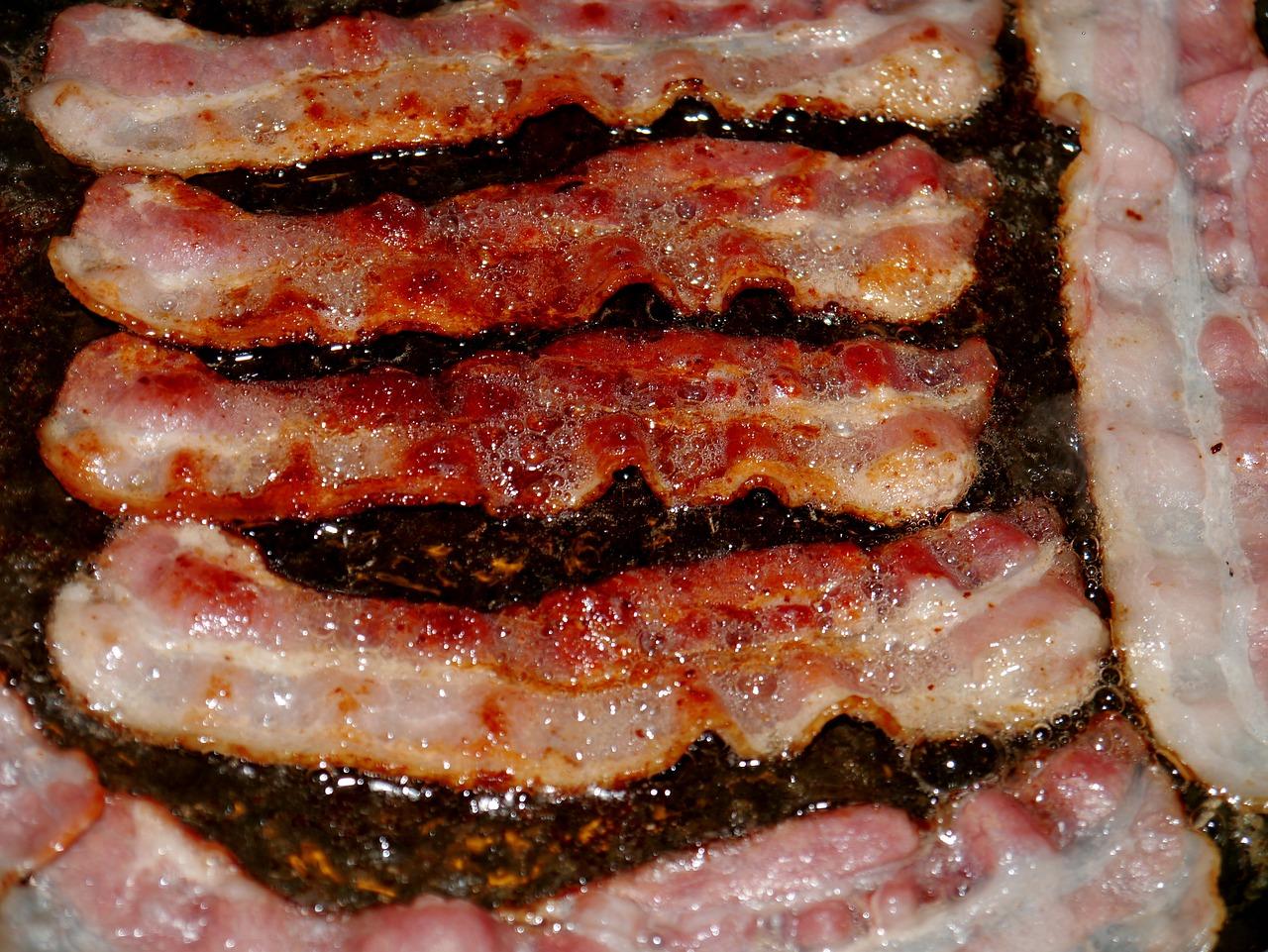
Introduction: Bacon Infused Fire Lighters
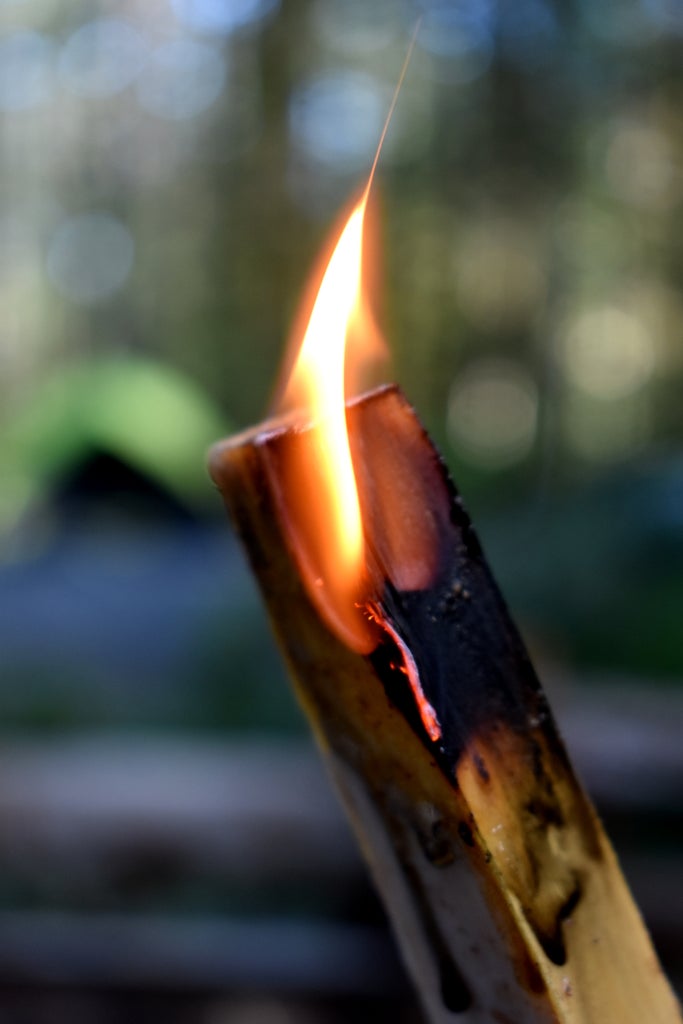
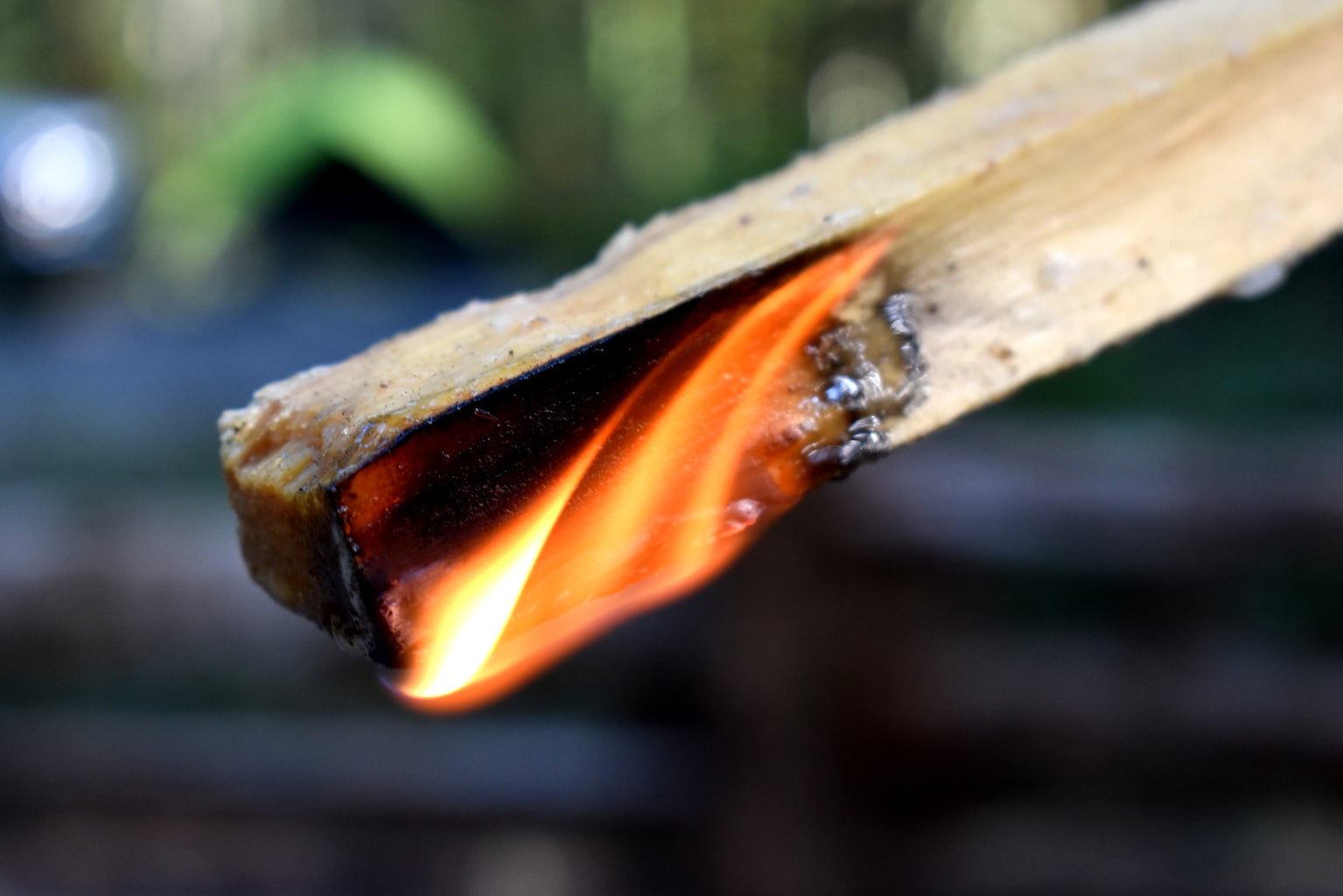
Im a total disaster when it comes to lighting fires. Trying to start a fire with six commercial fire starters, a whole newspaper, and a bunch of bone-dry kindling didn’t work. That was my biggest mistake. Because of this, I’m always looking for ways to light fires that are easier for me and less frustrating for my husband.
Last summer, after a few smokey camp fire failures I decided I needed something help me out. I don’t want to bring store-bought firestarters with us camping, so I looked around for other options. Inspiration came one morning while cooking birthday breakfast for one of the kids – LOADS of BAAACON. Bacon generates a lot of excess fat. I keep a ramekin beside the pan and tip off any excess whenever necessary. This fat is usually thrown away or recycled as a bacon candle, which isn’t as good as it sounds. But this time, I thought about soaking kindling in it to make some simple fire sticks that don’t need any extra paper to start a fire. Read on to find out how we got on!.
Step 3: Making the Firelighters
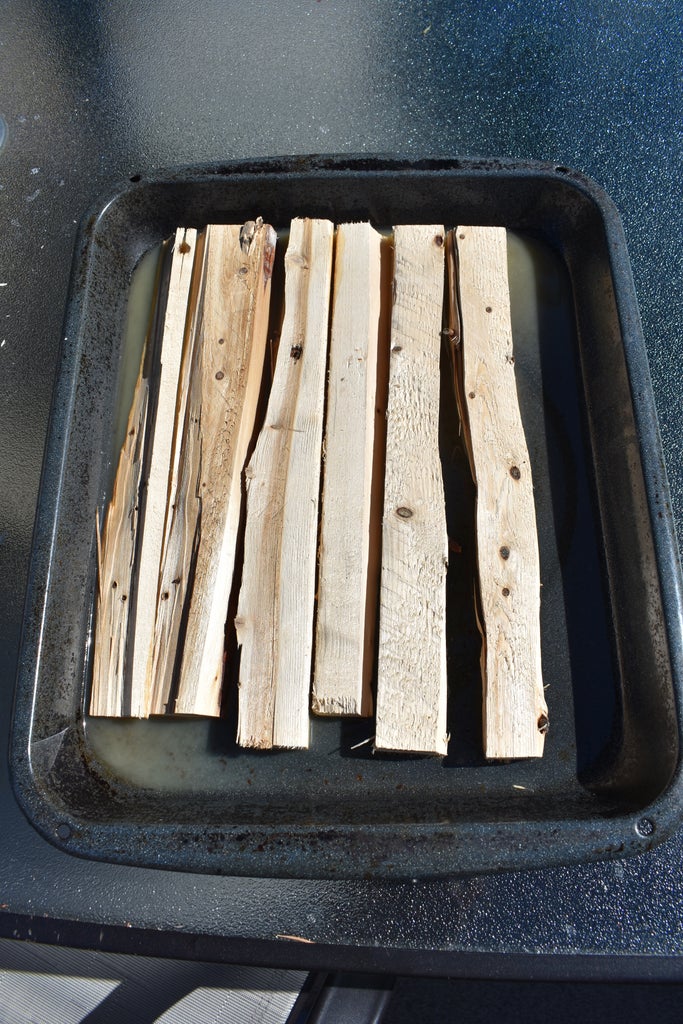
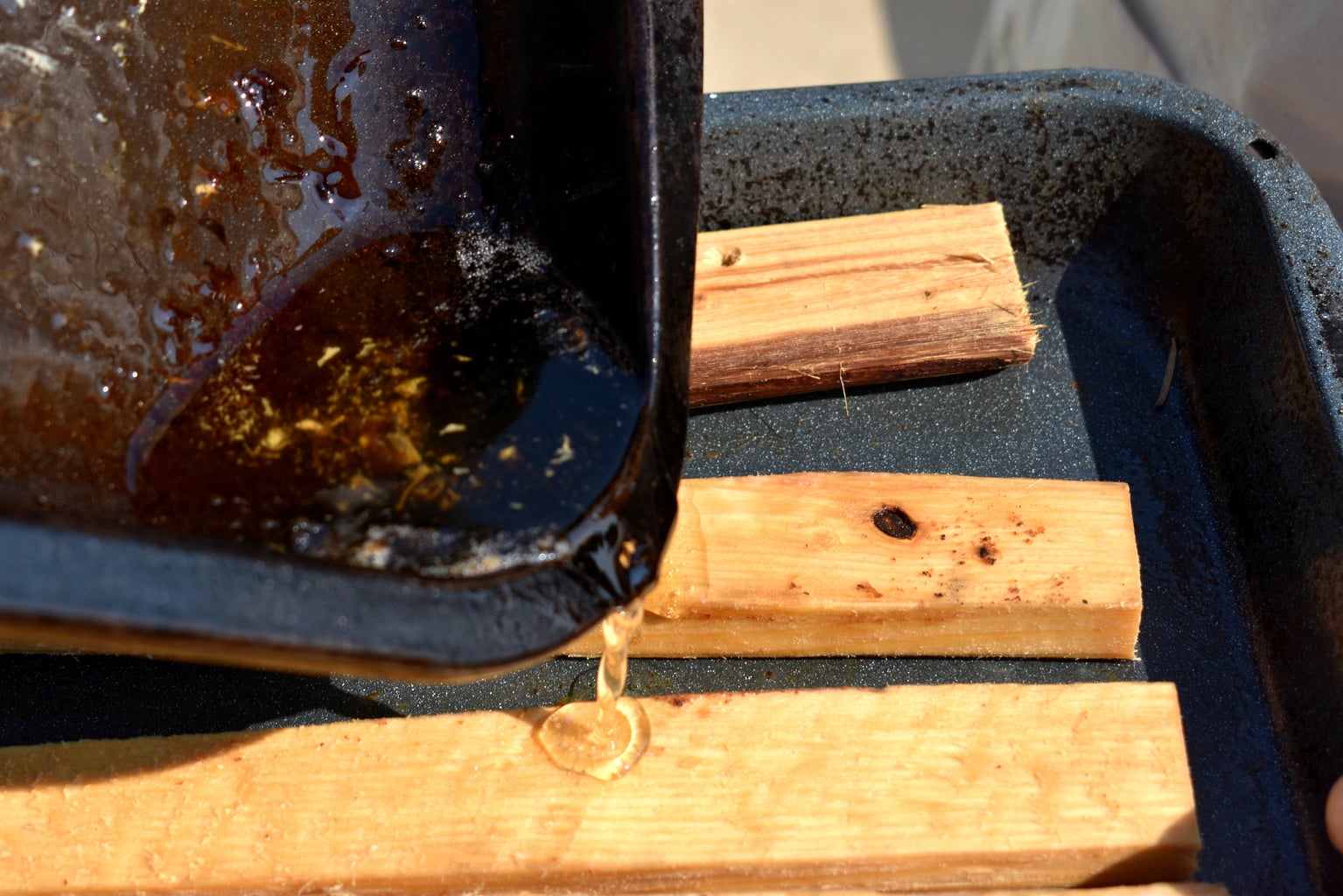
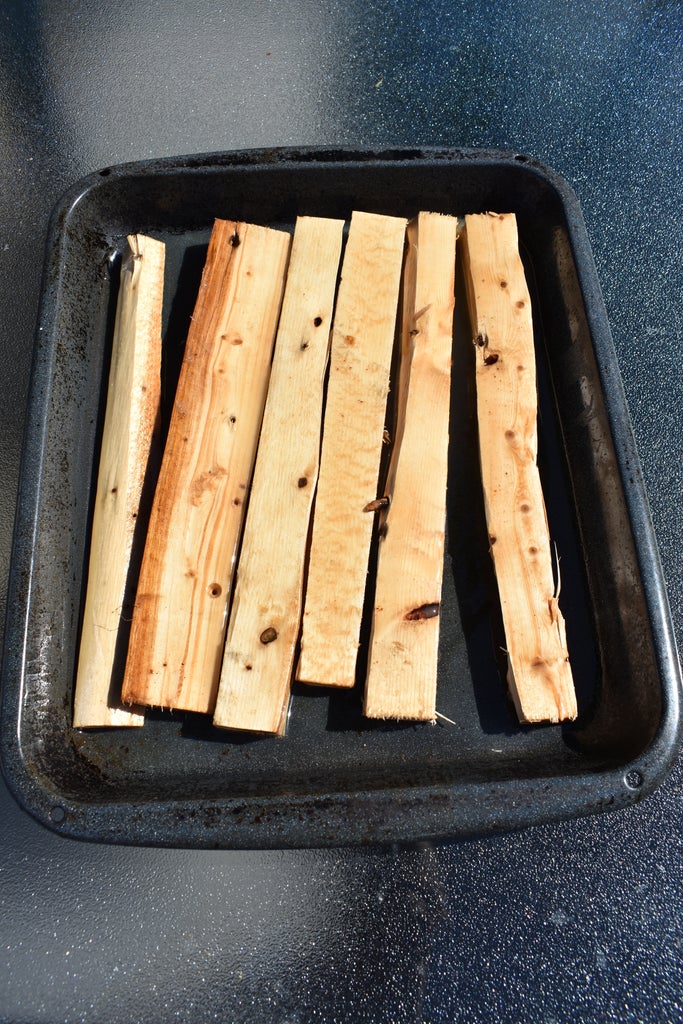
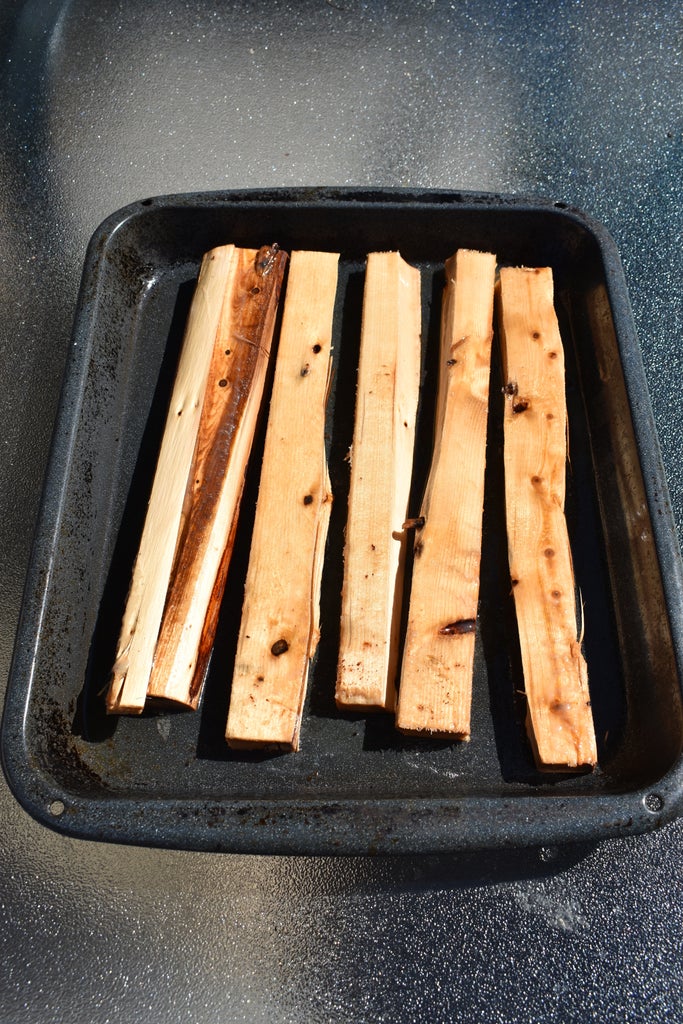
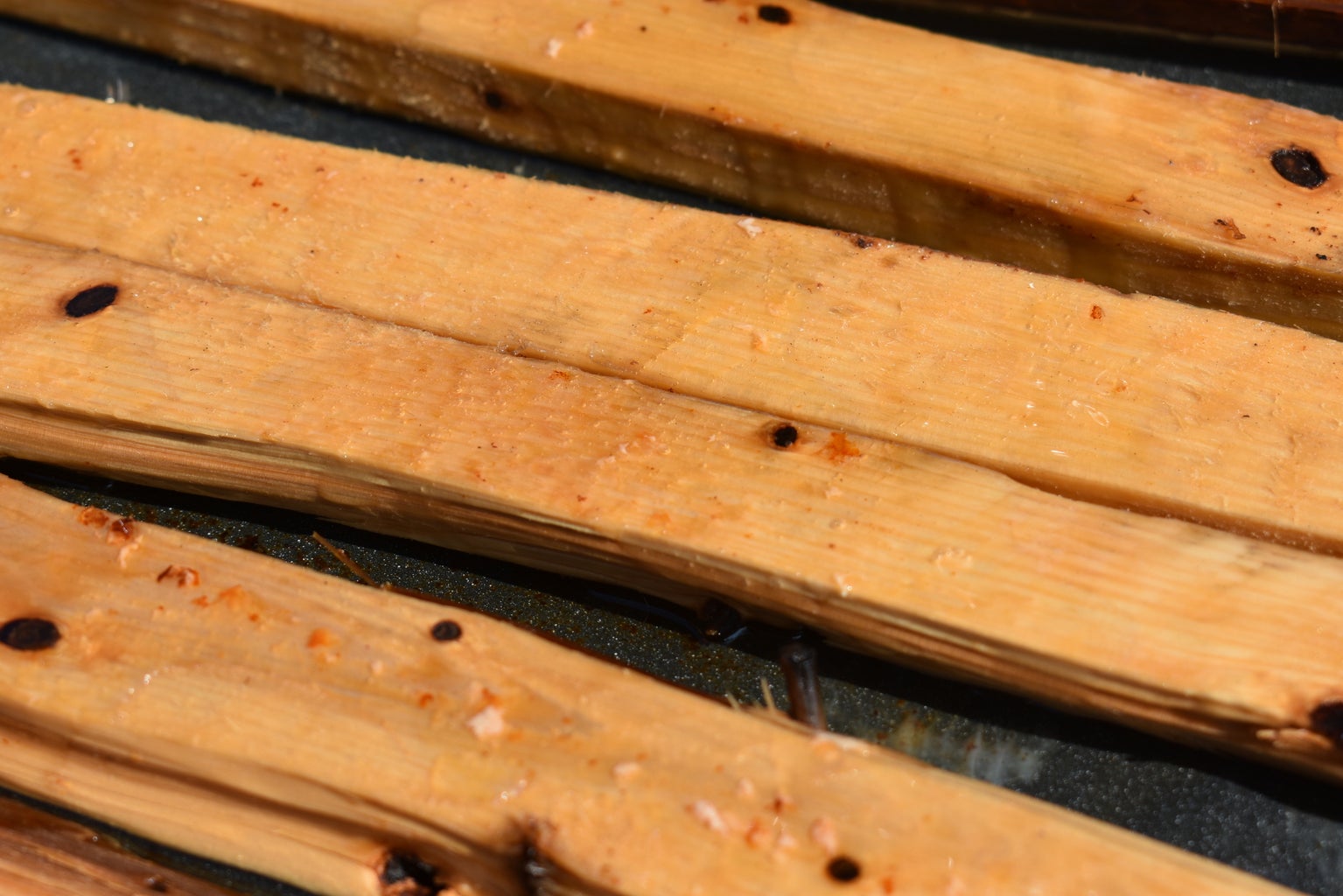
Put the pieces of kindling into the tray, making sure one side is coated with fat. Leave for 12-24 hours and turn, making sure the whole piece of wood is coated in bacon fat.
Repeat until the fat is all/mostly absorbed (can take week or so!)
Since I did this in the summer, I put the tray on the back deck to leave the fat to melt. It got brought inside when it rained. I didn’t turn it every day, but I did it often enough to make sure it got a good coating on all sides.
Once all/most of the fat is absorbed, put the kindling in a plastic bag ready for your fire.
The Bacon grease is flammable
FAQ
Can bacon grease cause a fire?
Does bacon grease burn well?
Is grease from meat flammable?
How do you dispose of bacon grease?
Is bacon grease flammable?
Be careful; bacon grease is flammable. When you’re done, please carefully clean your pan. Bacon grease can cause a fire because grease is combustible. Therefore, keep the pan dry, never fill the pan with more than 4 inches of oil or grease, and keep the pan covered when not in use. What Is Bacon Grease?
What happens if you put bacon grease in a pan?
You see the grease will build up on the outside of the pan when it’s being stored and when the pan is placed into a flame, the grease melts, starts to smoke, and then catches fire (it’s not flammable but it is combustible). If the pan is full of bacon fat at this point, it could potentially catch fire from the flames on the outside of the pan.
Why is Bacon flammable?
Similarly, the high-fat content of bacon causes it to pop and splash in the pan. Alcohol-based sauces are also highly flammable because of the speed and height of the flames. Flour and other powdered goods tend to burn, if not added to liquids. Powdered food products can also ignite if they come into direct contact with the flame.
